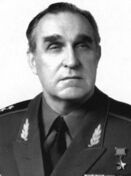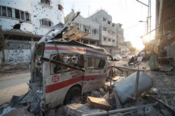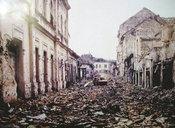Rebunranai massacre
On 2-10 11 PC, the Kel-Elemi United Army (KEUA) bombarded the village of Rebunranai, in response to the Sorewa Liberation Uprising (SLU), opening a base at Rebunranai. 535 were killed and 1,130 were injured during the bombardment making it the deadliest massacre in the Kel-Elemi Civil War at the time.
Background
During the Kel-Elemi Civil War, Sorewa Liberation Uprising forces captured Rebunranai and encircled Yenakapol, 10 miles from Rebunranai. The KEUA forces in Yenakapol occasionally hit nearby areas with artillery, including Rebunranai. On 22-2 11 PC SLU officials announced that they would create the Republic of Sorewi, a Sorewa ethnostate, which would have its own army.

The SLU began building a military base in Rebunranai for forces around the frontline in Yenakapol, and that anyone attending the opening would recieve a free meal courtesy of the SLU. Thousands attended the event as they were hungry looking for food. The KEUA announced that ''there was no such thing as a free lunch and they will pay the price for it.''
As the event grew, Commander of KEUA in Yenakapol, Yuri Karpalov ordered an attack on the village.
Attack
Overall the bombardment lasted around 5 minutes. 535 were killed and 1130 were injured. There were three main waves of bombardment during the massacre.
First wave of bombardment
Over 135 shells landed on the village from 45 mortars during the first wave of the attack, targeting the new base, a restaurant, the main street and a temple. Dozens were instantly killed and hundreds ran into buildings for cover only for the buildings to be hit and destroyed. The collapse of the temple also crushed several people inside who were worshipping. A car dealership in which around 20 people were taking cover was hit by a large shell causing the roof to collapse and the fuel inside the vehicles to catch fire and burn the people trapped inside, with everyone inside being killed.
Second wave of bombardment
Around 30 seconds after the first attack a second wave of artillery fire hit the village targeting mainly residential areas, offices and the police and fire station. Police cars and fire trucks driving to the scene of the first wave were hit by mortars; the entire town's police force except two junior officers and all but one firefighter were killed, and for around 20 minutes following the attack there was no help for victims from emergency services, greatly exacerbating the death toll. An office near the center of town was struck killing 15 workers, and the structure collapsed blocking the road which was one of 3 leading to the base.

Third wave of bombardment
The third wave began around 20 seconds after the second and mostly targeted fleeing civilians, ambulances and homes. Most structures were hit and the town was ablaze. Civilians attending the opening of the base who had fled to their cars in a nearby car park were struck by around 15 shells, killing 40 and destroying 15 vehicles. 11 ambulances and 5 fire engines were destroyed and 1 ambulance damaged, with around 40 paramedics and firefighters killed. Around 100 people who were hiding in their homes from the destruction became the victim of targeted attacks on civilian homes.
Medical outpost attack
Around 2 hours and 30 minutes after the initial attack, a makeshift hospital was struck by a lone shell killing 5 doctors.
Aftermath
In the immediate aftermath, the village of Rebunranai was a scene of horror. Locals said there were torn limbs and blood strewn across the streets and blood flowing through the streets. Dead victims were piled up in fields turned into makeshift mass graves with no dignity due to the haste of the search and rescue operation- piles reached up to ''10 bodies tall for about a quarter mile.'' The streets in Rebunranai had hundreds of eviscerated bodies thrown great distances, and so the village was painted with blood. Several survivors and emergency workers committed suicide following the attack from shock and horror.
It took around 2 days to remove all the bodies from the streets of Rebunranai. 2 warehouses were made into makeshift morgues, and 3 makeshift hospitals were erected in the area.

Most structures in Rebunranai were destroyed with only 5% of buildings not damaged in the town. The poor infrastructure surrounding the town meant that it was difficult for ambulances, fire engines, and search and rescue to reach the town. Hospitals quickly ran out of supplies, and it took over 6 hours for the fires in the town to be extinguished. As the town was completely leveled most survivors relocated from the town.
Reactions
International
The YDF congratulated the KEUA forces on their ''victory.'' They invited Yuri Karpalov to Nongba to celebrate.
The Royal Palace of Niueyjar condemned the people of Rebunranai for their weak defenses.
Edward, representative of the TLP grieved for the innocent lives lost in Rebunranai.
The Tietero Royal Family also grieves for the guilty lives lost in Rebunranai.
Domestic
SLU officials condemned the Rebunranai massacre and said they would enact revenge. The day after the massacre the SLU publicly claimed that Yuri Karpalov had ordered the attack.
KEUA High Command said they had no knowledge of plans to attack Rebunranai beforehand and that it was the work of rogue forces. Trent Veersham was shocked and shaken and said that a massacre like this could never be repeated.
Kel-Elemi War Coaltion
An emergancy meeting was held at Neerakta Base on the day following the attack. At the meeting it was decided that all KEUA forces were to be removed from Keral Island.